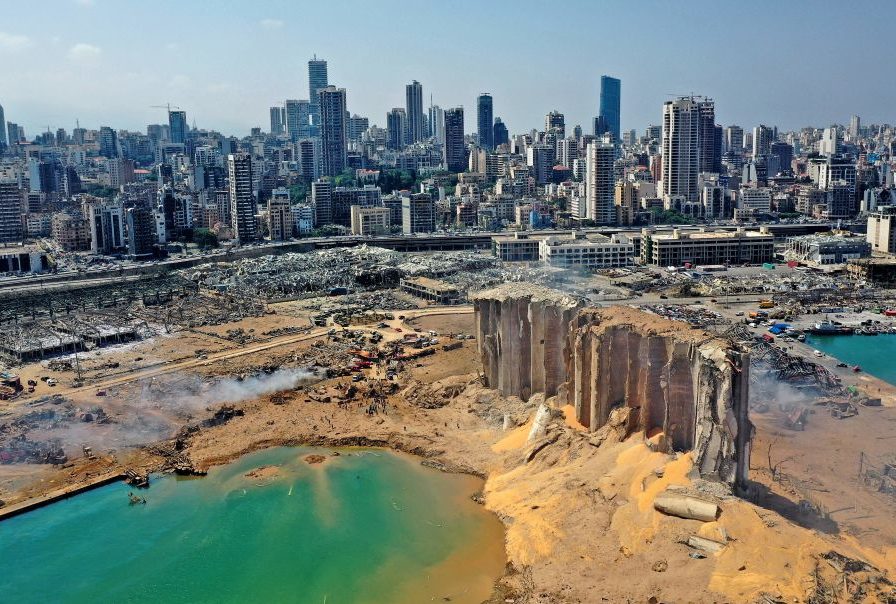Beirut blast could lead to another civil war in Lebanon

Last week, a warehouse stocked with nearly 3,000 tons of ammonium nitrate blew up, laying waste to the port of Beirut and ripping through much of the rest of the Lebanese capital. At least 200 people were killed, thousands were wounded, and hundreds of thousands were rendered homeless. For a country that was already roiled by political and economic crisis, the challenges ahead just became more profound. Even with the resignation of the country’s government, the only chance of overcoming them lies in root-and-branch reform of Lebanon’s political system and regional alliances.
According to Beirut’s governor, total economic losses from the blast may reach US$15 billion. Yet the Lebanese state is already on the brink of bankruptcy. And, with an incompetent kleptocratic regime running the country, no international lender, including the International Monetary Fund, is willing to offer it loans.
To be sure, in the wake of the latest crisis, Lebanon will receive considerable international aid. Already, donors have pledged nearly US$300 million in humanitarian assistance at a virtual summit, in order to support healthcare, food security, education and housing.
That money doesn’t come for free. To keep it from falling into ‘corrupt hands’, as French President Emmanuel Macron has put it, the aid will be routed through the United Nations, international organisations and NGOs, rather than the Lebanese government. They know that, if the country’s current rulers are in control of the finances, their contributions will only perpetuate corruption and crisis. Alas, this is just a temporary financial palliative that cannot address the root causes of Lebanon’s maladies, and could indeed relieve internal pressure on the country’s political class.
Yes, international donors are calling for political and economic reform. But the sad truth is that overcoming Lebanon’s powerful vested interests—including both its domestic ruling class and the external powers, such as Iran and Syria, that wield considerable domestic influence—will be next to impossible. Lebanese President Michel Aoun, a Hezbollah puppet, would not even agree to the call for an international inquiry into the port blast, claiming that this could ‘dilute the truth’.
Lebanon’s polity reflects the country’s permanent sectarian strife. All that stands between relative calm and violent chaos is a fragile power-sharing system encompassing competing ethnic and religious groups, including Maronite Christians, Druze and Sunni and Shia Muslims.
But that system has long depended on massive capital inflows, which allowed the sectarian elite to entrench itself through patronage. A sudden stop to inflows last year shattered the system’s foundations, spurring widespread protests and shaking Lebanon’s delicate peace.
Yet Lebanon’s internal dynamics can hardly be separated from regional developments. Lebanon’s sectarian politics have enabled foreign powers to gain a strong foothold in the country, turning it into an integral part of the Iran-led ‘axis of resistance’ against Israel’s and America’s regional designs.
Iran’s lavish support for Hezbollah has enabled the Shia political party and militia to become what is probably the world’s most powerful non-state actor, with military capabilities that dwarf those of Lebanon’s army. It is telling that, when Macron visited Beirut after the port explosion, crowds chanted, ‘free us from Hezbollah’.
But Hezbollah enjoys broad-based support among Lebanon’s Shia, who comprise almost one-third of the country’s population and form the most powerful sect, politically and militarily. Perhaps more important, Lebanon’s sovereignty continues to be subverted by Iran, which is committed to using Hezbollah to advance its own strategic priorities. When the Beirut blast occurred, a United Nations–backed special tribunal was days away from issuing its verdict in the trial of four alleged members of Hezbollah for the 2005 murder of former Lebanese Prime Minister (and Saudi Arabia’s man in Beirut) Rafik Hariri.
Of course, Iran’s regional designs have spurred resistance: the spectre of an Israel–Hezbollah war has lately been growing. The Beirut blast’s silver lining may be that it averts—or at least forestalls—such a conflict, in which Israel would destroy Lebanon’s infrastructure to neutralise the 150,000 missiles that Hezbollah has concealed among the civilian population before they devastate Israel’s vulnerable home front.
Lebanon’s distress makes it more difficult for Israel to conduct such a pre-emptive attack on Hezbollah’s military capabilities and discourages Hezbollah from antagonising Israel. But whatever mutual deterrent exists is fragile, at best. If Hezbollah (with Iran’s help) develops precision-guided missiles, all bets will be off.
Even without such weaponry, the international community’s hope of using aid as leverage to bring about change—a hope shared not only by Western powers like France, but also potentially by Saudi Arabia and the other Gulf states—is unlikely to bear fruit. As Macron himself reportedly told US President Donald Trump, sanctions against Hezbollah play into the hands of those they are meant to weaken, including Iran.
That said, Lebanon’s vibrant and well-developed civil society has forced change before. After Hariri’s assassination, the Cedar Revolution—a series of demonstrations under the motto of ‘freedom, sovereignty and independence’—forced the withdrawal of Syrian troops from Lebanon.
But Lebanese civil society faces far stiffer opposition today than anything the embattled Syrians could mount in 2005. Over the last 15 years, Iran has spent lavishly to turn Lebanon into its strategic playground. As a result, Hezbollah is more powerful and Lebanon more subservient to external powers—including Iran, Syria and Russia—than ever.
These powers will not sit back and allow a reform of the political system that has made Lebanon such a crucial link in their regional strategy, even at the price of turning the country into another Libya. Far from a new Cedar Revolution, efforts to push reform could lead to a conflict much like the civil war of 1975–90, in which foreign powers and rival local militias join forces and tear Lebanon apart.
